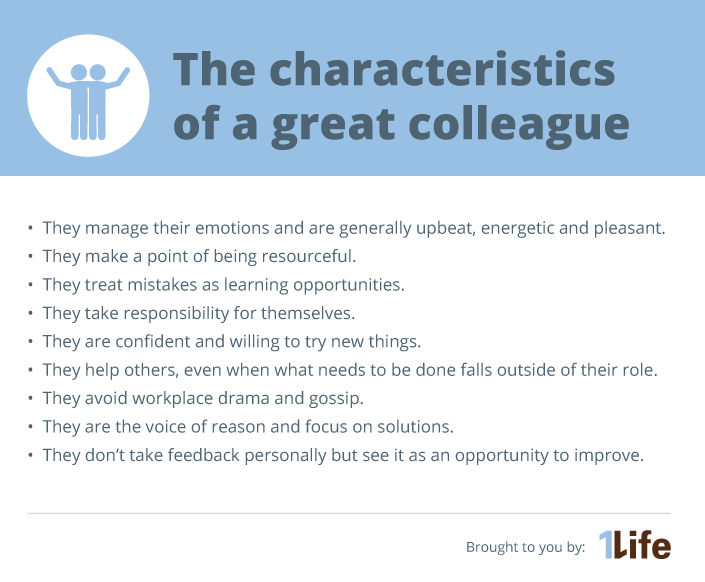Some people just seem to have that workplace mojo. They are respected and liked by everyone and their teams produce the best results. The question is, are they just naturally like that, or is their workplace success the result of careful thought and planning? The answer is probably a bit of both, but there are certainly steps that you can take to become the colleague that everyone wants to work with.
We spoke to Barbara Walsh, a director at Metaco Consulting, and an executive and team coach, about how to be the person everyone wants on their team. These are some of the things she says you need to consider on your mission to be a dream colleague:
You don’t need to take sides to be liked.
Focus on the job at hand Being likeable and liked is important, but never lose sight of the fact that you are there to get the job done - and that’s what people will respect you for. Try to be upbeat, enthusiastic and solutions-focused, and to prioritise your workload while still being supportive of others.
“I think that people who are nice to work with are those who are calm, creative, results driven and focused on what needs to be addressed,” Barbara says. “But they never lose sight of the fact that they are part of a team and do what they can to keep everyone else on track and happy as well.”
Manage your personal life Gone are the days when employees were expected to never share any aspect of their personal lives. Barbara recalls a client of hers saying that one of her colleagues had gone from being an easy person to get along with, to becoming irritable, sarcastic and irrational. Raising the matter only made it worse.
The reason only became clear when the colleague took a few days off to attend to his wife’s funeral. She’d had cancer. He had felt it necessary to keep work and home issues separate, so nobody at work knew. Yet he had a team of people around him who could have supported him through this difficult time.
“The lesson for my client was to take notice of changes in behaviour with colleagues and make a point of talking to the individual and being supportive, even if this is initially rejected. She also decided to share more herself,” says Barbara.
While sharing can be good for individuals and relationships, it is important to understand that a supportive environment doesn’t mean condoning bad behaviour or poor performance. And, of course, you should be sensible and sensitive about what kind of information you share, and how much of it. This is, after all, a professional relationship - so be wary of oversharing inappropriately.
Be a team player While some people thrive on team building or work socialising, for others, these are unpleasant experiences, and are sometimes not possible given home-life constraints like parenting or other commitments. Barbara says that if you can’t participate in team building or socialising, you should address your non-participation with your team.
“What is important is that you set your own boundaries based on what is comfortable for you. What could be more counterproductive than going against your own values or constraints? The stress this creates will negatively affect your own performance. Instead, suggest other ways in which your team could bond, that could be enjoyable for you all.”
But most importantly, she says, make a point of being a good team player during working hours.
Communicate well Great colleagues keep the lines of communication open. “Conversations are necessary to keep relationships connected,” Barbara says. “Relationships become disconnected when we don’t have the important conversations – especially the challenging ones, but the easier ones as well.”
So make time to check in with your colleagues about how they’re doing, personally and professionally, and make a point of addressing the difficult issues when they come up.
Avoid drama Barbara says that it is estimated that between two and four hours a day are wasted on workplace conflict, and that these figures are validated by her experience at the companies that she has worked with.
“Being the person who is known for bringing rationality and clear focus back to the team will go a long way towards building great relationships with team mates – and is likely to draw the attention of your bosses to your leadership potential when development opportunities arise,” she says.
It can sometimes seem as if being liked and getting the job done are conflicting requirements. But Barbara says that the exceptional colleague finds a way to balance them. “Being understanding doesn’t mean that you have to get caught up in anybody else’s drama. By focusing on the job at hand and getting others to do the same, you can save a lot of time and achieve better results.”
Be true to you Barbara says that it is important that any personal strategy that you implement is a reflection of your authentic self. You are not going to win friends by straining to be social when you are a natural introvert, for example. However, by identifying a need to interact positively with your co-workers and finding a way to do this that’s true to who you are, you’ll go a long way to being liked and respected for the right reasons.
The bottom line Being a great colleague takes effort - especially when there are stresses and deadlines piling on. But it’s worth prioritising relationships with your co-workers to help make your office a pleasant and productive place to be, for you and everyone around you. Barbara says that as with everything else in life, the trick is finding your harmony. Sometimes you’ll need to focus hard on work, other times you’ll need to spend more time on relationships – as long as it all evens out in the end.





